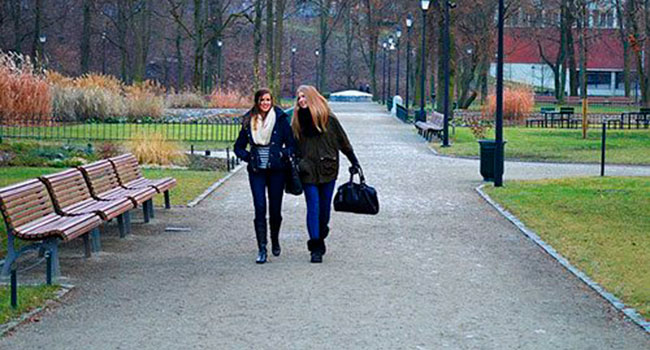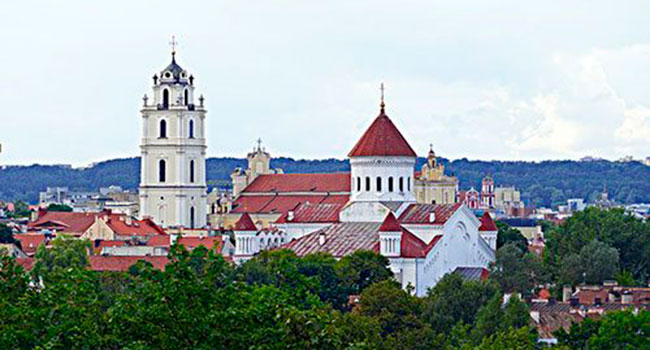 Vilnius, the capital of Lithuania, is a charmingly historic European city that tells a chilling tale of sorrow.
Vilnius, the capital of Lithuania, is a charmingly historic European city that tells a chilling tale of sorrow.
Our hotel, directly across from Lukiškės Square (formally Lenin Square and, yes, the statue is gone), stands opposite the Genocido aukų muziejus, a museum dedicated to preserving the memory of the many victims of Soviet cruelty.
This dark classical-fronted building was once the headquarters of the infamous KGB. Today, it’s preserving the past; in particular it’s chronicling the brutal Soviet occupation of this proud Baltic nation of three million people.
It’s distressing to walk along its cold exterior facade and read the names carved into the granite foundations of the many Lithuanian patriots who were tortured and killed within those walls.

The history of Lithuania is one of struggle and compromise. The country has been subject to repeated invasions, caught in the violent hinterland between East and West. With no natural barriers, foreign armies have overrun Lithuania regularly, dating back to those brutal 14th century militaristic monks, the Teutonic Order knights.
And yet, somehow, despite repeated attempts to obliterate it, Lithuania remains free, home to an independent people.
But even today, Russian military preparations along the border are obvious and disturbing. Given recent events in Ukraine, and the Russian design to probe along the boundaries of its empire, Lithuanian authorities are ever vigilant and – not surprisingly – delighted to be part of the larger European Union and NATO.
Perhaps the most remarkable symbol of defiance in Lithuania’s struggle for independence involves basketball and the rock band the Grateful Dead.
The story begins with the Soviet Red Army basketball victory in the 1988 Olympic games. This pre-Berlin Wall story involves a predictable gold medal for the Soviets in basketball and the entirely unpredictable fact that of the five starters on that team, four were from the tiny Soviet outpost of Lithuania.
To make a long and glorious story short, after the fall of the Berlin Wall and independence for Lithuania, the star players of the former Soviet team were brought together to bring glory to their native homeland.
One problem: the newly-formed state had no money and the team’s dream was dying before it had begun. Enter Jerry Garcia and the Grateful Dead. Once they heard of the plight of the impoverished Lithuanian team, they decided to sponsor their run to Olympic glory, complete with those famous uniforms: tie-died T-shirts emblazoned with Grateful Dead iconography.
Although the Lithuanian team didn’t win gold in 1992 (that went to the U.S. Dream Team), they finished with a stunning victory over the Russian Federation and cemented their place in the hallowed halls of Lithuania glory.

Not surprisingly, the Lithuanians are caught between worlds – they’re glad to be free of Soviet tyranny but are embracing the West with nervous caution.
Why?
Lithuania is one of the most religious nations in Europe. The country’s extraordinary churches are architectural wonders that seem to be around every corner. On Christmas morning, I was surprised to find them packed to overflowing with enthusiasts. I found this somewhat ironic, considering the general trend towards secularism in the West. And the fact that Lithuania was the last pagan European nation to be Christianized (in the 15th century).
Lithuanians are a counterbalance to a lot of the negativity found in the West these days. It’s surprisingly refreshing to be among people who know the reality of the world and who (unlike many Canadians) have fewer reservations about western civilization. For example, having experienced real dictators, the Lithuanians don’t partake in the general condemnation of Donald Trump. As far as they’re concerned, Trump may be self-serving and somewhat authoritarian, but he doesn’t begin to compare with the cold brutality of Josef Stalin and Adolf Hitler.
Even so, as a westerner the question I heard most often in the many cafes and bars was “What is capitalism?” Young people in particular say, “We’ve escaped Soviet communism but we’re not sure that western capitalism is exactly right for us. It’s a free-for-all and no one seems to know what to do.”
I assured them that many others are asking the same questions.
Encouragingly, enthusiasm for all things modern is embraced openly by a young generation of Lithuanians who feel very western and from the look of things are preparing to take on the world.
Robert McGarvey is an economic historian and former managing director of Merlin Consulting, a London, U.K.-based consulting firm. Robert’s most recent book is Futuromics: A Guide to Thriving in Capitalism’s Third Wave.
Robert is a Troy Media Thought Leader. Why aren’t you?
The views, opinions and positions expressed by columnists and contributors are the author’s alone. They do not inherently or expressly reflect the views, opinions and/or positions of our publication.
